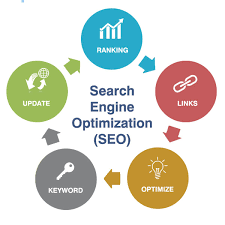
In today’s digital age, where the online landscape is vast and competitive, having a strong online presence is crucial for businesses looking to succeed. Search Engine Optimization (SEO) plays a pivotal role in enhancing visibility and driving organic traffic to websites.
SEO is the practice of optimizing a website’s content, structure, and other elements to improve its ranking on search engine results pages (SERPs). By understanding how search engines work and what users are searching for, businesses can tailor their online presence to meet these criteria effectively.
In conclusion, Search Engine Optimization is not just about ranking higher on search engines; it’s about providing valuable content and experiences that resonate with your target audience. By investing in SEO strategies tailored to your business goals, you can unlock the full potential of your online presence and stand out in a crowded digital landscape.
To enhance your website’s search visibility, it is essential to conduct thorough keyword research to pinpoint relevant search terms that resonate with your target audience. By identifying the right keywords, you can tailor your content and meta tags to align with what users are actively searching for, ultimately improving your chances of ranking higher on search engine results pages. Keyword research forms the foundation of effective Search Engine Optimization (SEO) strategies and ensures that your website is optimised to attract organic traffic from users seeking your products or services.
To enhance your website’s search visibility, it is crucial to optimise your meta tags, such as title tags and meta descriptions. These elements provide concise summaries of your web pages to search engines and potential visitors. By crafting compelling and relevant title tags that accurately reflect the content of each page, you can improve click-through rates and organic traffic. Similarly, well-crafted meta descriptions can entice users to click on your site by offering a preview of what they can expect to find. Optimising these meta tags not only boosts search engine rankings but also enhances user experience and engagement with your website.
Creating high-quality, original content that offers genuine value to users is a fundamental tip in search engine optimization. By producing content that is informative, engaging, and relevant to your target audience, you not only establish credibility and authority in your industry but also increase the likelihood of attracting organic traffic to your website. Search engines favour websites that offer valuable content to users, so investing time and effort into creating compelling material can significantly enhance your online visibility and drive better results in search rankings.
Utilizing heading tags such as H1, H2, and so on is a crucial tip in search engine optimization. By structuring your content with these tags, you not only enhance the readability of your web pages for users but also provide search engines with valuable information about the hierarchy and relevance of your content. This practice helps search engines understand the key topics of your page, improving its chances of ranking higher in search results. Therefore, incorporating heading tags effectively can significantly boost both the user experience and SEO performance of your website.
Improving website loading speed is a crucial aspect of search optimization. A faster-loading website not only enhances user experience by reducing wait times and increasing engagement but also positively impacts search ranking. Search engines prioritize websites that offer a seamless browsing experience, and faster loading speeds are a key factor in determining a site’s ranking on search engine results pages. By optimising website loading speed, businesses can not only attract and retain visitors but also improve their visibility and competitiveness in the online landscape.
Building quality backlinks from reputable websites is a crucial aspect of search engine optimization. By establishing links from trustworthy sources, you enhance your site’s credibility and authority in the eyes of search engines. These backlinks serve as a vote of confidence for your content, signalling to search algorithms that your website is a valuable resource worth ranking higher in search results. Focus on cultivating relationships with authoritative sites to strengthen your backlink profile and boost your site’s visibility and trustworthiness online.
When it comes to enhancing your website’s visibility in image searches, a crucial tip is to optimise images with descriptive filenames and alt text. By using relevant keywords in the filenames and alt text of your images, you not only improve accessibility for visually impaired users but also signal to search engines the content and context of the images. This practice can significantly boost your chances of appearing in image search results, attracting more organic traffic and increasing overall visibility for your website.
Regularly monitoring and analysing your website’s performance using tools like Google Analytics is essential for effective search engine optimisation. By tracking key metrics such as website traffic, user behaviour, and conversion rates, you can gain valuable insights into how your site is performing and identify areas for improvement. Google Analytics provides in-depth data that can help you make informed decisions about your SEO strategies, allowing you to refine your approach and enhance the overall user experience. Consistent monitoring ensures that you stay informed about the impact of your efforts and enables you to adapt to changing trends in the digital landscape.